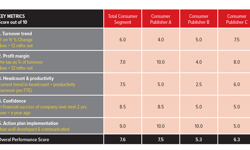Many of us could happily spend over an hour reading a Sunday paper. But if we go to that newspaper's website, we decide after ten minutes that we have read everything we want to read, even though the content is exactly the same.
Why is this? We clearly read an article on paper very differently to how we read it on screen.
And as a publisher, thinking about how we provide value to our advertisers, this is something which we should have a much deeper understanding of.
I started thinking about this question after getting engaged in conversations with our advertisers, about whether or not they should be trying online advertising.
My normal answer is, "People tend to flit around websites very quickly, going from link to link. So they are not going to spend much time looking at your banner advert. As an advertiser, you want to attract the attention of potential buyers in a comfortable environment, so they start warming to the idea of buying your service."
So, wouldn’t it be fair to say that advertising is worth a lot more when it is on paper than on the screen...
From an advertiser’s perspective, online advertising works well if they have something on their own website which they want to take the user to - and they can use the advert to explain what great things they will find if they click on it.
But this is only a small proportion of all advertising – the bulk of it has a purpose to convey a quick 10 second message, or get a buyer vaguely aware of your offering.
Whilst we read so much online, this reading is a different kind of reading – we jump around between different articles, and rarely get deeply engaged.
The critical issue is the 'give up' point - the point when we are reading something, when we decide we're not interested, don't actually understand it, can't be bothered to work out what it is actually about.
My personal experience is that this 'give up point' arrives much quicker when reading online.
If our give up point arrives quicker when reading online, but we still read an enormous amount online, then this must mean a broader but shallower reading experience.
The echo chamber effect
We stay in our own comfort zone. You can see this clearly by looking at the comments on the Evening Standard site about the mayoral elections. The Standard chose to take a very partisan view of the elections, very anti Ken Livingstone.
The Standard provides opportunity to make comments on its online articles. You might expect, following a particularly anti Ken article, that there would be plenty of pro Ken comments to redress the balance.
But the opposite happens. The only people bothering to make comments are the anti-Ken readers, who are comfortable reading anti-Ken articles. The pro-Ken readers have already left.
The different way we read online and on print is, to a large extent, what we have trained ourselves to do.
When reading online, we generally have a lot of distractions, including our screaming email box. We have learned to develop highly sensitive internal early warning systems that indicate when the material we are reading is probably not contributing to us much. People flit-read more on the web than on paper.
When reading on print, there is the perception that the material is better, because someone at least has bothered to pay for the paper and the printing.
So, as publishers, we face a situation where people are reading more online but are both less engaged and less inclined to venture beyond their comfort zone. And advertisers are still sceptical about the benefits of banner and other online display advertising.
What to do
Here are a few ideas about how a publisher can make money moving forward:
* Build reader loyalty. People who talk about putting 'news' and 'content' in front of 'eyeballs' exhibit a fundamental non-understanding of how the media works. People do not consume content; they develop a relationship with specific media outlets and stick to it, and trust information from that media outlet much more than one they do not know. Building up reader loyalty is a slow process, but a loyal reader base is an asset which can be monetised in many different ways - so long as you find ways of doing it which don't annoy people.
* Do something with the contacts. B2B publishing is geared around one thing – bringing buyers and sellers together. Website news services might be poor vehicles for banner advertising, but they are very good at generating highly valuable lists of people interested in niche subject areas. Sign them up for an email newsletter (or magazine) which includes paid for information about the seller (not just display advertising).
* Develop exhibitions, and not just as ‘media partners’. Most exhibition / conference companies in the B2B arena are keen to put together 'media partner' deals with magazines, where they promise to give the magazine the prestige of being associated with the event, and, in return, the conference company persuades the magazine to assist with subject knowledge, promoting the conference in the magazine, and providing access to mailing lists. There must be plenty of publishers agreeing to this kind of media partner deal (or I would not keep getting besieged by requests from conference companies from Washington to Beijing to be a media partner). But this could well be a very poor deal from the publisher's point of view. The publisher would be better off having the courage to develop its own conferences.
* And finally ... enter partnerships. Can the publisher and advertiser dance a little closer together? Doing this in a way which does not erode the reader's trust requires a lot of understanding and balance from both publisher and advertiser. But there are plenty of ways advertisers and publishers can work together without eroding that trust.
FEATURE
The reading experience
Despite the increase in podcasts and video, the bulk of what we produce is designed to be read. With the growth of online content, the reading experience has undoubtedly changed, as we react in very different ways to on and offline content. Karl Jeffery says that publishers need to do much more to understand the implications of this.










